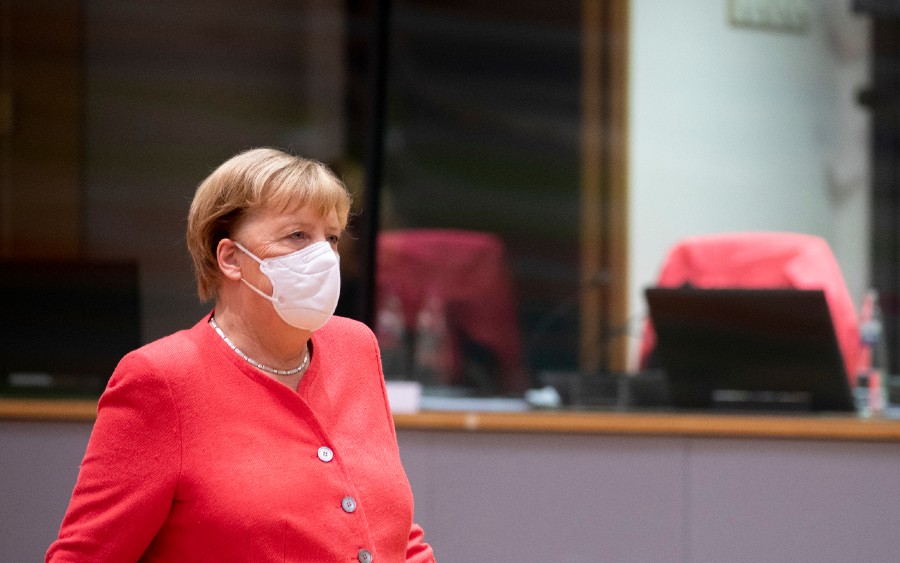The small silver star at the tip of Aleksandar Djordjevic’s Mercedes shines bright. He polishes it every week.
Djordjevic makes combustion engines for Daimler, one of Germany’s flagship carmakers. He has a salary of around 60,000 euros (about $70,000), eight weeks of vacation and a guarantee negotiated by the union that he cannot be fired until 2030. He owns a two-storey house and that E-class 250 model Mercedes in his driveway.
All of that is why Djordjevic polishes the star on his car.
“The star is something stable and something strong: It stands for Made in Germany,” he said.
But by 2030 there will be no more combustion engines at Daimler — or people making combustion engines.
“I’m proud of what I do,” Djordjevic said. “It’s unsettling to know that in 10 years’ time my job will no longer exist.”
Djordjevic is the picture of a new German pride and prosperity — and German anxiety.
As Chancellor Angela Merkel prepares to leave office after 16 years, her country is among the richest in the world. A broad and contented middle class is one facet of Merkel’s Germany that has been central to her longevity and her ability to deliver on a core promise of stability. But her impact has been far greater.
To travel the country she leaves behind is to see it profoundly transformed.
There is the father taking paid parental leave in Catholic Bavaria. The married gay couple raising two children outside Berlin. The woman in a hijab teaching math in a high school near Frankfurt, where most students have German passports but few have German parents.
There is the coal worker in the former communist East voting for a far-right party that did not exist when Merkel took office. And two young brothers on a North Sea island threatened by rising sea levels who do not remember a time when Merkel was not chancellor and cannot wait to see her gone.
“She has known about the danger of climate change for longer than we’ve been alive,” one of the brothers told me while standing on the grassy dike that protects the small island, Pellworm, from flooding. “Why hasn’t she done anything about it?”
As Merkel steered her country through successive crises and left others unattended, there was change that she led and change that she allowed.
She decided to phase out nuclear power in Germany. She ended compulsory military service. She was the first chancellor to assert that Islam “belongs” to Germany. When it came to breaking down her country’s and party’s conservative family values, she was more timid but ultimately did not stand in the way.
“She saw where the country was going and allowed it to go there,” said Roland Mittermayer, an architect who married his husband shortly after Merkel invited conservative lawmakers to pass a law permitting same-sex marriage, even though she herself voted against it.
No other democratic leader in Europe has lasted longer. And Merkel is walking out of office as the most popular politician in Germany.
Many of her post-War predecessors had strongly defined legacies. Konrad Adenauer anchored Germany in the West. Willy Brandt reached across the Iron Curtain. Helmut Kohl, her one-time mentor, became synonymous with German unity. Gerhard Schröder paved the way for the country’s economic success.
Merkel’s legacy is less tangible but equally transformative. She changed Germany into a modern society — and a country less defined by its history.
She may be remembered most for her decision to welcome over a million refugees in 2015-16 when most other western nations rejected them. It was a brief redemptive moment for the country that had committed the Holocaust and turned her into an icon of liberal democracy.
“It was a sort of healing,” said Karin Marré-Harrak, the headmaster of a high school in the multicultural city of Offenbach. “In a way we’ve become a more normal country.”
Being called a normal country might seem underwhelming elsewhere. But for Germany, a nation haunted by its Nazi past and four decades of division between East and West, normal was what all post-War generations had aspired to.
Almost everywhere, however, there was also a nagging sense that the new normal was being threatened by epic challenges, that things cannot go on as they are.
Djordjevic lives near Stuttgart, the capital of Germany’s powerful car industry. In 1886, Gottlieb Daimler invented one of the first cars in his garden here. These days the city is home to Daimler, Porsche and Bosch, the world’s biggest car-part maker.
If the American dream is to get rich, the German dream is job security for life.
Djordjevic, 38, always knew he wanted to work for Daimler. His father worked there until he died. “It was like an inheritance,” he said.
When he got his first job at age 16, he thought he had arrived. “I thought, ‘That’s it,’” he recalled, “‘I’ll retire from here.’”
Now he is less sure. Like other German carmakers, Daimler was late to start its transition to electric cars. Its first pure electric model was launched only this year.
Daimler’s target is to phase out combustion engines by 2030. No one knows what exactly that means for jobs, but Djordjevic was doing the math.
“There are 1,200 parts in a combustion engine,” he said. “There are only 200 in an electric car.”
“Sustainable cars are great, but we also need sustainable jobs,” he said.
Exit polls
Early exit polls throughout the day have suggested a very tight race between Merkel’s centre-Right Christian Democratic Union and the centre-Left Social Democrats. Most have showed the Social Democrats slightly ahead, but in at least one the Christian Democrats had the edge. A couple had them tied. Turnout was expected to surpass the 76 per cent recorded in 2017, when the last national elections were held. “It’s a nail biter,” said Andrea Römmele, dean of the Hertie School in Berlin.
New York Times News Service










